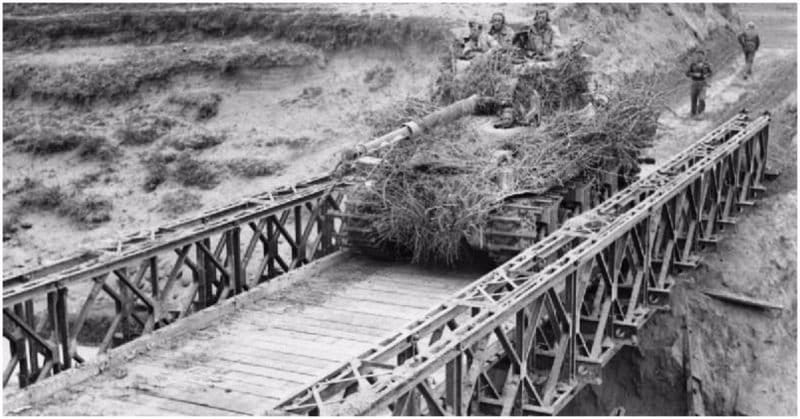An Untimely Transfer
There were persistant rumors before D-Day that if the Allies invaded France the Germans would use gas.

The WO attached such importance to the stories that amongst their roadside dumps were large numbers of mustard-gas shells. They were never sent to France. After a time some of the shells started to leak with their contents oozing out. Ordinance were unable to remedy this, and, since anyone in the general public could easily receive severe burns, the Royal Navy sank the defective shells in the Channel.
Allied forces had not yet standardized equipment signs. It was vital to keep very close touch with the US branch of Air Dispatch, operating from airfields that were immediately West of the 48th. The US markings on shells for 'smoke' were the same colors as the British markings for 'gas'. There was always a fear of a mix-up occurring if one of them ran short of one type of ammunition and borrowed from the other. A very nice US Liaison Officer was attached to the British HQ and the favor reciprocated.
One of Edgar Whitehead's biggest headaches was to know how to guard the stores dispersed over two counties. They included food rations and petrol, items also in short supply for civilians. The Police, Home Guard and even the Americans helped them but he was glad not to be the officer who tried to balance the stocks after operations ended. The US had the sensible rule of writing off any stores shipped to an active theater of war. But the British Army persisted in accounting for everything, and stores were his responsibility as Administrative Officer.
After the Normandy breakthrough it was possible to land supplies by ship and his work grew somewhat less though there were a number of special drops such as supplying a Bailey Bridge to an Armored Division held up by the retreating enemy blowing up a bridge over a major river. This operation was completed in four hours from the time the request was received. It took thirty Dakotas to drop the sections.
Glider training was started, and this involved a difficult disciplinary case as glider flying was not popular. One day a driver refused to enter a glider. An officer was sent for. He still refused. The officer gave the order in writing. Still he refused. He was then arrested and charged with 'while on active service refusing to obey a lawful order'. The case was referred to Edgar as the Chief Administrative Officer. After conferring with the Deputy Judge Advocate General on the case's legal aspects Edgar decided there was no alternative to a Field General Court Martial.
A couple of days later a Major-General rang Edgar from the WO saying, "This Court Martial of yours, Whitehead, it's a bit awkward because we find the man is one of the London Passenger Board drivers especially released to teach the R.A.S.C. to drive. I am afraid if you go on with the case questions will be asked in the House of Commons. What will the effect be on the Unit if the charge is dropped and the man posted to another Unit?"
"We have three thousand men and none of them are keen to fly in gliders as they know the pilots have only a few weeks training. If this man gets away with it I expect a number of further cases."
There was a few seconds pause, then the reply came, "Alright, go ahead and charge him."
A few days later, a signal arrived from the WO posting Edgar to the British Army Staff, Washington, to attend a short War Course at the US Staff College at Fort Leavenworth, Kansas.
Edgar's CO was furious. He had spent two months teaching Edgar his job. He went to London to protest. When he returned he said, "I could not get your posting rescinded."
"Why?"
"It means a promotion for you."
"Why are they sending me to Leavenworth when the war is nearly over? Everyone knows as soon as we have victory, I'll be returning to Rhodesia."
"There are many lengthy examinations to pass so we want to send officers with good university degrees who will do us credit."
"You're taking a chance on me. It's eighteen years since I last sat for a major examination!"
Edgar often wondered whether his removal to the US was due to the proposed Court Martial which was dropped after his departure. The following month the Unit took part in the Market Garden Operations and suffered heavy casualties. Apparently radios were defective and further hampered by dense woodlands. The Allies defeat there meant the war would not be over by Christmas as hoped.
(More than 1000 military cargo aircraft and five hundred gliders carrying twenty thousand troops, over five hundred vehicles and at least three hundred artillery pieces flew from England to the south of the Netherlands. British and Polish Divisions were dropped near Arnhem, but thick fog in England and low clouds over the battle zone hampered both resupply and the air-lifting of reinforcements. Around two thousand Britons lost their lives in their defeat at Arnhem and more than six thousand more were taken prisoners of war.)
The historical novel Whitewashed Jacarandas and its sequel Full of Possibilities are both available on Amazon as paperbacks and eBooks.
These books are inspired by Diana's family's experiences in small town Southern Rhodesia after WWII.
Dr. Sunny Rubenstein and his Gentile wife, Mavourneen, along with various town characters lay bare the racial arrogance of the times, paternalistic idealism, Zionist fervor and anti-Semitism, the proper place of a wife, modernization versus hard-won ways of doing things, and treatment of endemic disease versus investment in public health. It's a roller coaster read.
References:
- Sir Edgar Whitehead's Unpublished Memoirs, Rhodes House, Bodleian Library, Oxford University, by permission.
Photo Credit:

- https://www.training4engineers.com/blog/2020/6/7/the-bailey-bridge-instrumental-in-winning-world-war-ii
- Watch the 1977 epic film "A Bridge Too Far"


